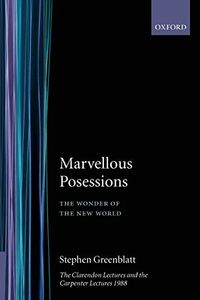
endast ny
Marvelous Possessions
`And there I found very many islands filled with people innumerable, and of all of them I have taken possession for their highnesses, by proclamation made and with the royal standard unfurled, and no one contradicted me' - Christopher Columbus Marvelous Possessions is a study of the ways in which Europeans of the late Middle Ages and the early modern period represented non-European peoples and took possession of their lands, in particular the New World. In a series of innovative readings of travel narratives, judicial documents, and official reports, Greenblatt shows that the experience of the marvelous, central to both art and philosophy, was cunningly yoked by Columbus and others to the service of colonial appropriation. He argues that the traditional symbolic actions and legal rituals through which European sovereignty was asserted were strained to breaking-point by the unprecedented nature of the discovery of the New World. But the book also shows that the experience of the marvelous is not necessarily an agent of empire: in writers as different as Herodotus, Jean de Léry, and Montaigne - and notably in Mandeville's Travels, the most popular travel book of the Middle Ages - wonder is the sign of a remarkably tolerant recognition of cultural difference.
Utgiven: 1992
ISBN: 9780198122661
Förlag: Clarendon Press
Format: Häftad
Språk: Engelska
Sidor: 216 st
`And there I found very many islands filled with people innumerable, and of all of them I have taken possession for their highnesses, by proclamation made and with the royal standard unfurled, and no one contradicted me' - Christopher Columbus Marvelous Possessions is a study of the ways in which Europeans of the late Middle Ages and the early modern period represented non-European peoples and took possession of their lands, in particular the New World. In a series of innovative readings of travel narratives, judicial documents, and official reports, Greenblatt shows that the experience of the marvelous, central to both art and philosophy, was cunningly yoked by Columbus and others to the service of colonial appropriation. He argues that the traditional symbolic actions and legal rituals through which European sovereignty was asserted were strained to breaking-point by the unprecedented nature of the discovery of the New World. But the book also shows that the experience of the marvelous is not necessarily an agent of empire: in writers as different as Herodotus, Jean de Léry, and Montaigne - and notably in Mandeville's Travels, the most popular travel book of the Middle Ages - wonder is the sign of a remarkably tolerant recognition of cultural difference.
Ny bok
1048 kr1103 kr
5% studentrabatt med Studentapan
Begagnad bok (0 st)
Varje vecka tillkommer tusentals nya säljare. Bevaka boken så får du meddelande när den finns tillgänglig igen.



